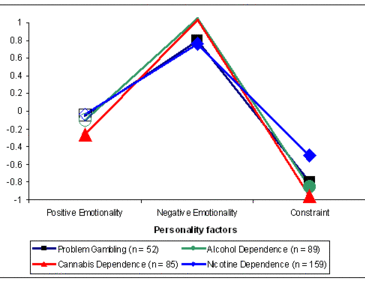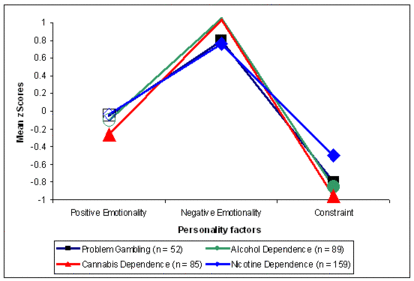As far as public health is concerned, the age range between 18 and 21 is a particularly important period. In the United States, people are not allowed to purchase cigarettes legally before they are 18 years old; are not allowed to purchase or drink alcoholic beverages legally before age 21; and have few legal gambling options before age 18. Beginning at their 18th birthday, young adults increasingly are exposed to opportunities to engage in addictive behaviors such as gambling, alcohol and tobacco use. When young adults have the opportunity to begin gambling and using substances, what determines who will develop addictive disorders? How valid is it to link psychosocial and personality characteristics with the development of gambling and addictive behaviors? This week’s WAGER presents a prospective study by Slutske et al. (2005) that explored the role of personality antecedents in explaining disordered gambling behavior and its comorbidity with substance-related disorders among young adults.
The study collected information from a birth cohort of young adults born in Dunedin, New Zealand (N=939: 475 men, 464 women). Researchers used the Multidimensional Personality Questionnaire (MPQ) to collect information on personality from the participants at age 18. The MPQ consists of ten scales that represent three main factors: positive emotionality, negative emotionality, and constraint. Positive emotionality refers to happiness, engagement in work and/or social environments, and general satisfaction with life. Negative emotionality, on the other hand, includes anxiety, anger, and inability to cope with stress. Constraint includes measures of social norm endorsement, self-control, and harm avoidance.
When the cohort was 21 years old, researchers conducted structured interviews with them about addictive behaviors. These interviews yielded classifications of problem gambling (i.e., endorsing at least three problems) using the South Oaks Gambling Screen (Lesieur & Blume, 1987), and diagnoses of alcohol, cannabis, and nicotine dependence based on DSM-III- R criteria (American Psychiatric Association, 1987).
Two major outcomes emerged from the research. First, as shown in Figure 1, youths diagnosed as disordered gamblers at age 21 had, on average, higher scores on negative emotionality (d =0.90) and lower scores on constraint (d = -0.72) measured at age 18 years compared with other members of the cohort. These results suggest that individuals who tend to have anxiety, anger or stress and those who tend to disregard rules, take risks, and have poor self-control are more likely to develop gambling problems than those who conform to social norms and have adequate self-control. Positive emotionality was not related to the likelihood of becoming a disordered gambler. As can be seen in Figure 1, the pattern of these results was replicated for youth with alcohol, cannabis, and nicotine dependence.
Figure 1. Personality Factors and Addictive Behaviors. (Adapted from Slutske, et al.)
Note: The Z scores reflect the distribution of scores for people without addiction problems (i.e., the control group), where 0 = the mean of the control group and 1 = the standard deviation of the control group. Dark squares indicate that the score is significantly different from the control group’s mean. The problem gamblers group included all participants who endorsed three or more items on the SOGS.
The other major outcome was that, in this youth cohort, gambling problems were significantly associated with substance use disorders and the magnitude of the relationship was similar across different substances. Gamblers with problems were about 3.6 times more likely to be alcohol dependent, 3.3 times more likely to be cannabis dependent, and 3.4 times more likely to be nicotine dependent than other youths without such gambling difficulties. The authors also showed that these relationships were largely accounted for by personality factors.
Based on these results, the authors concluded that people with gambling problems share personality profiles with people with other addictive disorders. People with gambling problems, alcohol, cannabis, or nicotine dependence all tended to score higher on negative emotionality and lower on constraint than people without addiction problems. Similarities in personality characteristics accounted for much of the overlap among addictive disorders.
One limitation of the study is that, though the research was prospective, addictive disorders were not measured at age 18. As a result, it cannot be determined whether the personality characteristics were truly antecedent to the development of addictive disorders or whether they emerged after problems with addiction began.
The commonalities in the association between personality characteristics and addiction to a variety of objects resonate with the notion of addiction as single disorder or syndrome with multiple expressions and common etiology (Shaffer et al., 2004). Yet the hypothesis that an underlying cluster of personality characteristics, namely “addictive personality,” causes the problem of addictive disorders is not simple. Although certain personality traits can be associated with addictive disorders, personality changes also can result from drug seeking and using (Shaffer, 2000). Whether personality profiles are the result of gambling or substance use is largely unknown. Reciprocal relationships might exist between personality and various addictive behavior patterns. Longitudinal studies are necessary to unravel the relationships and methods capable of recognizing complex causal inference, such as Structural Equation Modeling, should be considered.
What do you think? Comments on this article can be addressed to Ziming Xuan.
References
American Psychiatric Association. (1987). Diagnostic and Statistical Manual of Mental Disorders, Revised Third Edition. Washington, DC: American Psychiatric Association.
Lesieur, H. R., & Blume, S. B. (1987). The South Oaks Gambling Screen (SOGS): a new instrument for the identification of pathological gambler. American Journal of Psychiatry, 144, 1184-1188.
Shaffer, H. J. (2000). Addictive Personality. In A. E. Kazdin (Ed.), Encyclopedia of Psychology (Vol. 1, pp. 35-36). Washington, DC: American Psychological Association and Oxford University Press.
Shaffer, H. J., LaPlante, D. A., LaBrie, R. A., Kidman, R. C., Donato, A. N., & Stanton, M. V. (2004). Toward a Syndrome Model of Addiction: Multiple Expressions, Common Etiology. Harvard Review of Psychiatry, 12, 367-374.
Slutske, W. S., Caspi, A., Moffitt, T. E., & Poulton, R. (2005). Personality and Problem Gambling: A Prospective Study of a Birth Cohort of Young Adults. Archives of General Psychiatry, 62, 769-755.





